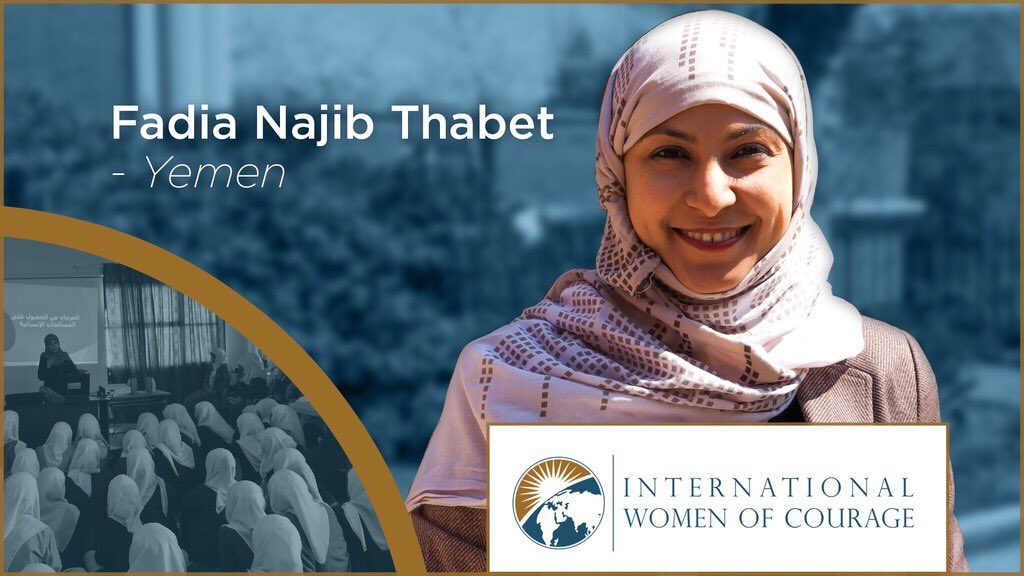Fadia Najib Thabet receives International Women of Courage Award
June 27th, 2017 | SIT Graduate Institute

Fadia Najib Thabet recognized for her work to protect children from Al Qaeda and Houthi militias in Yemen
On March 29, 2017, Fadia Najib Thabet sat on a stage at the US State Department alongside 12 other women. Each of the 13 women came from a different country. They worked in different fields. One was a blogger, another an educator. There was a nun, an army major, and a lawyer. All 13 women were activists working to promote human rights in their countries.
And all were together on that stage to receive the US Secretary of State’s International Women of Courage Award.
The award “annually recognizes women around the globe who have demonstrated exceptional courage and leadership in advocating for peace, justice, human rights, gender equality, and women’s empowerment, often at great personal risk.” Since the award’s inception in 2007, more than 100 women from more than 60 countries have been honored.
Under Secretary Thomas A. Shannon started the proceedings. In his opening speech, he said, “Women’s empowerment is not just a moral imperative; it is a strategic investment in our collective security. In short, when women do better, countries do better.”
As with all the honorees, it was a desire to do good that had brought Fadia to this point.
For six years, Fadia worked in Yemen to protect children from Al Qaeda and Houthi militias. She rescued children who had been abducted, forced to be soldiers, raped. Some of the children were left with permanent physical injuries. All had emotional scars. Fadia helped reintegrate the children into their communities.
She also documented human rights violations. This meant collecting evidence to prove violence happened. “It wasn’t an easy process for us,” she says. “My team and I, we put our lives at risk many times. It was hard to report about those cases because it’s very sensitive, and you are working against everyone.”
Eventually, she was able to develop an action plan with the United Nations to better protect children from conflict. It was for her work over those six years that Fadia was about to be honored.
In 2016, she came to the US as a Hubert H. Humphrey Fellow. She is now working on a master’s degree in peacebuilding and conflict transformation at SIT Graduate Institute.
With so much experience already in peacebuilding, why did Fadia decide to pursue an MA?
“I want to get what I can from the class to change the humanitarian work, to change the peacebuilding,” Fadia says. She wants to “get something that I haven’t done in the past . . . that I can do in a different way.”
“I’m really lucky to be here at SIT,” she adds. She credits her professors for this. “They have a very rich experience in the field, which is something I guess we all need, which is completely different than any kind of different universities that I was in in the US.”
Fadia is honored to receive the International Women of Courage Award, but she’s already looking ahead.
“I want to go back to Yemen and continue doing humanitarian work in war and post-war zones,” she says. “But my focus this time will be different: how I’m going to engage more women in peace talks.”
She sees the need for reconciliation between all the parties affected by the war. In addition to civilians, she says, “we need also government, we need tribe leaders, we need imams, we need everyone in the society to be part of this reconciliation process. That’s how we’re going to achieve peace and how we’re going to overcome this kind of conflict.”
And for Fadia, women are the key. She wants to see more women from her country study peacebuilding. “I want to encourage more young girls to join this program so we can move forward with our country,” she says. “We’re going to rely on us to build peace.”
Listen to the VPR story
Read the story in the Valley Advocate
Read the story in The Commons
